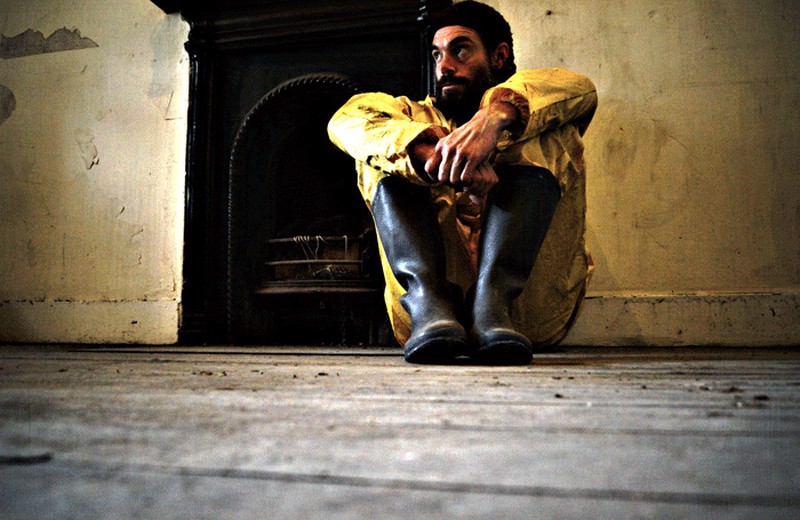 At the very top of C Nova, up flights of increasingly dusty and ancient-looking stairs, is the tiny atmospheric room used for Sirenia, a piece designed for a maximum of sixteen audience members. Unlike Jethro Compton’s Bunker Trilogy, where the attic staging in C venues initially demanded some suspension of disbelief, here the set-up immerses us immediately in the world of the play, as if I really were seated directly in a cramped and sparse room within a lonely lighthouse. A revolving beam of light, representing the lighthouse’s beacon, reveals a basic set, a few of the keeper’s personal artefacts, and a bashed-up radio and communication system. Sound effects and radio broadcasts further set the scene as in pitch darkness we hear about a missing lighthouse keeper, before the never-ending rain takes over once again.
At the very top of C Nova, up flights of increasingly dusty and ancient-looking stairs, is the tiny atmospheric room used for Sirenia, a piece designed for a maximum of sixteen audience members. Unlike Jethro Compton’s Bunker Trilogy, where the attic staging in C venues initially demanded some suspension of disbelief, here the set-up immerses us immediately in the world of the play, as if I really were seated directly in a cramped and sparse room within a lonely lighthouse. A revolving beam of light, representing the lighthouse’s beacon, reveals a basic set, a few of the keeper’s personal artefacts, and a bashed-up radio and communication system. Sound effects and radio broadcasts further set the scene as in pitch darkness we hear about a missing lighthouse keeper, before the never-ending rain takes over once again.
Rob Pomfret plays keeper Isaac Dyer with a gruff and wholly believable persona, giving the impression that he is always on the edge of giving in to some deep, barely repressed emotion. We see Isaac go about his duties, preparing for a storm that seems bound to be metaphorical as well as literal. As he rushes in and out, water droplets fly from his raincoat and the failing radio and intermittently working communication system all help to skilfully build tension and to signal impending doom. Within the turmoil, Isaac hears the wail of a siren song and rushes outside to rescue a drowning girl from the rocks, played with an excellent veneer of vulnerability by Evie Tyler. The stakes are heightened as it becomes clear that she will die without medical assistance, yet the weather and the lack of technology make this impossible. And then, finally, in this combustible scenario, when the unnamed girl comes to, fortified by rum and Isaac’s clumsy attempts to warm her with blankets, there is something decidedly strange and otherworldly about her.
‘The girl’ seems to have no recollection of who she is or how she ended up washed up in such a remote spot. She does, however, seem to have a knack for encouraging Isaac to talk, and he eventually opens up about his heartbreaking reason for living out at sea. His confession is framed with some beautiful imagery in a lyrical script by Cornish writer/producer Jethro Compton, which, along with Isaac’s melodic singing, the dim lighting, and the howling wind creates a visceral sense of being lost at sea. The eventual denouement is very well executed by the actors, but, compared to what had gone before, felt a little clunky. Drawing strongly from Celtic myth, to relate the girl to Isaac’s own past necessitated substantial exposition, which for me diluted the feel of the piece. However, this was remedied by a haunting final image as Isaac’s resonant bass tones flow out of him and he slowly prepares himself to enter the sea.
